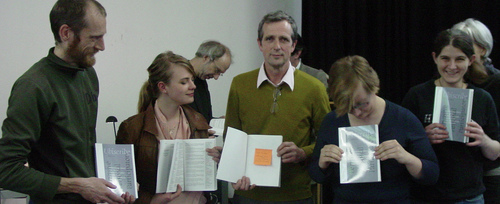Started reading through The Rustle of Language, collected shorter essays of Roland Barthes from the period 1966 – 1980. Some of these I’ve read before, a few I’ve read many times — like From Work to Text. I particularly like Barthes when breaking free of it, the structuralism of his earlier work is still present.
Having read 80 pages up till now, I’m struck by 2 things: 1. the ‘beauty’ of Barthes writing — even when glues together too many subordinate clause in one sentence, 2. how clearly al lot of what he writes fits in, well, the Zeitgeist. However ‘timeless’ and ‘abstract’ his theorizing of reading and writing may be, reading through these essays again, it becomes apparent how much it was also grounded in, let say, the ‘spirit’ of the times, and how much his ideas are tied to issues that seem to’ve been topical at the time.
Anyway, some by now ‘classic’ quotes:
‘(…) the Paradox of the reader: it is commonly admitted that to read is to decode: letters, words, meanings, structures, and this is incontestable; but by accumulating decodings (since reading is by right infinite), by removing the safety catch of meaning, by putting reading into freewheeling (which is its structural vocation), the reader is caught up in a dialectical reversal: finally he does not decode, he overcodes; he does not decipher, he produces, he accumulates languages, he lets himself be infinitely and tirelessly traversed by them: he is that traversal.’ On Reading, p. 42
‘Writing is that neuter, that composite, that obliquity into which our subject flies, the black-and-white where all identity is lost, beginning with the very identity of the body that writes.’ The Death of the Author, p. 49
‘The author is a modern character, no doubt produced by our society as it emerged from the Middle Ages, infelcted by Enlish empiricism, French rationalism, and the personal faith of the Reformation, thereby discovering the prestige of the individual, or, as we say more nobly, of th “human person”.’ The Death of the Author, p. 49/50
‘(…) linguistics furnishes the destruction of the Author with a precious analytic instrument, showing that the speech-act in its entirety is an “empty” process, which functions perfectly without its being necessary to “fill” it with the person of the interlocutors: linguistically the author is nothing but the one who writes, just as I is nothing but the one who says I: language knows a “subject”, not a “person”, and this subject, empty outside of the very speech-act which defines it, suffices to “hold” language, i.e., to exhaust it.’ The Death of the Author, p. 51
‘(T)he modern scriptor is born at the same time as his text: he is not furnished with a being which precedes or exceeds his writing, he is not the subject of which his book would be the predicate. (…) (W)riting can no longer designate an operation of recording, of observation, of representation, of “painting” (…) but instead (…) a performative.’ The Death of the Author, p. 52
‘Once the Author is distanced, the claim to “decipher” a text becomes entirely futile. To assign an Author to a text is to impose a brake on it, to furnish it with a final signified, to close writing.’ The Death of the Author, p. 53
All quotes from Roland Barthes, The Rustle of Language (transl. Richard Howard), University of California Press, Berkeley &c., 1989 (1986/1984).
& when I said that Barthes’ theory is tied to topical issues of the sixties, I mean for instance that his ‘death of the author’ also has to be seen in the perspective of the struggle against a certain kind of literary criticism, a way of teaching literature that was very much ‘under fire’ then. As long as Barthes’ theory is applied to literature and to writing as such, I have always found it very inspiring and to the point. As soon as one tries to apply it to political or legal speech, problems arise. I’d say.
